#insect declines
Text
Knapweed bonanza: insect biodiversity in a fallow field
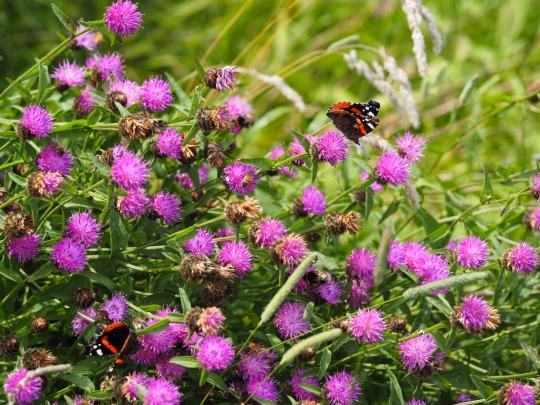
View On WordPress
#Bedfordshire#Biodiversity#Bumblebees#Butterflies#Cirsium arvense#common knapweed#creeping thistle#Fallow field#Honey bees#insect abundance#insect declines#insect diversity#knapweed#meadow#set aside
5 notes
·
View notes
Text
How Non-Native Plants Are Contributing to a Global Insect Decline
The impact of introduced plants on native biodiversity has emerged as a hot-button issue in ecology. But recent research provides new evidence that the displacement of native plant communities is a key cause of a collapse in insect populations and is affecting birds as well...
#non-native plants#invasive species#environment#conservation#insect decline#insect#insects#entomology#biodiversity#animals#nature#botany#plants#non-native invasive species
1K notes
·
View notes
Text
Are fireflies going extinct? Why lightning bugs may soon flicker out.
34 notes
·
View notes
Text
Something has happened to this bee
youtube
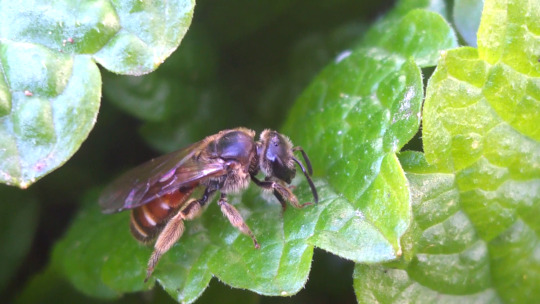
This year (2023) there were several waves of insect deaths, as you could see from the dead insects lying in large numbers on the streets when you went for a walk. In September there were hardly any insects to be seen, apart from a few flies, stink bugs and wasps. I wonder if this was a global problem. Please leave a comment.
#nature#insects#bees#apis mellifera#my photos#my videos#musicandgallery#musicandgallerynature#insect decline#insect decline 2023#Youtube
8 notes
·
View notes
Text
Blocking the tag entomology and some other insect-related tags is the best thing I've ever done. :') I just wish people considered that a tw for insects is needed, but oh well... It's so rare to see something being tagged that can indeed cause a lot for entomophobic person. Or at least cw or something? It'll so much helpful
#nonsims#delete later#olya's rambles#PLEASE DON'T ATTACK ME BUT#entomologysts and insect-sympathetic or whatever people sound like cultists in some way#the way they talk about those... creatures#lmao#“THERE'S A DECLINE IN INSECTS” okay well I'm glad there is why you're so upset#I'm just so tired of seeing untagged bug pictures...#I can't get the imagine for a solid five minutes out of my head#and when I see an insect on dash (untagged) I just- I feel like I'm going to cry every single time#yeah I have a lot of problems with these fuckers can I please be myself and express this? because I'm a human too#I just can't get the idea of an insect out of my head for a long time#it's triggering me so much and I'm becoming super paranoid about it because I start to check every place in my apartment to make sure#and thinking about them being there being in my body you know this stuff okay
3 notes
·
View notes
Text
I'm very confused by the lack of (I guess) cross-discipline topics talked about in undergraduate degrees. Unless this is specific to my school or something. But multiple times I've had professors who... don't know anything about a major ecological/environmental problem in their discipline. Maybe it's because I come at topics from a social/environmental direction rather than economic or purely scientific. But many times I've had professors who know the ins and outs of a scientific process but not much about how it exists in the real world. Like my entomology class hasn't even mentioned insect decline, and I asked my professor the other day if they knew anything about pesticide impact on insect populations and they knew nothing about it... I know I can't expect everyone to know everything I get into but.............. how do you get a whole PhD and not come across these topics. How do you teach a college class on a topic and don't know a major crisis within that topic.
#like i know I'm kinda abnormal and spend half my time reading and studying#but also we desperately need to connect different sciences and social issues#agriculture should not be separate from ecology should not be separate from environmental science should not be separate from system design#tbf my Entomology prof isnt in agriculture BUT insect decline has been talked about for years now....... its not just an ag issue
3 notes
·
View notes
Note
Vali, how do you feel about the declining insect population that's happening?

With a dead-pan expression, Valeriu looks you dead in the eye and in a seemingly perfectly genuine tone, he says:
"Oh, I love it, that's my favorite. I exacerbate it personally by devouring every insect I can find. I will be the last bug standing."
Sometimes it's just so hard to tell when hes joking.
#HJFBJshjgbhjdgnhjHLDBHJHASD#vali: take a WILD guess#i dont think he likes it anon :(#ic.#ask.#crack.#anon.#also i guess this only applies to earth vali because if you asked vali before he went to earth he would be like#'...the insect populations are declining? SINCE WHEN??'
9 notes
·
View notes
Photo
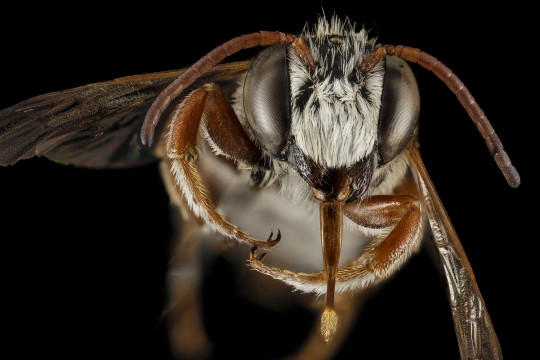
Megachile farinosa: a rather rare species and with conspicuous red legs, a feature which is very uncommon in European Megachile. This species flies in high summer and the female gathers pollen only on the flowers of Vitex agnus-castus.
Some alternative or past names for the species include Chalicodoma farinosa or Pseudomegachile farinosa. Account and specimen capture on the island of Lesvos in Greece by Jelle Devalez. Photograph by Brooke Alexander.
14 notes
·
View notes
Text

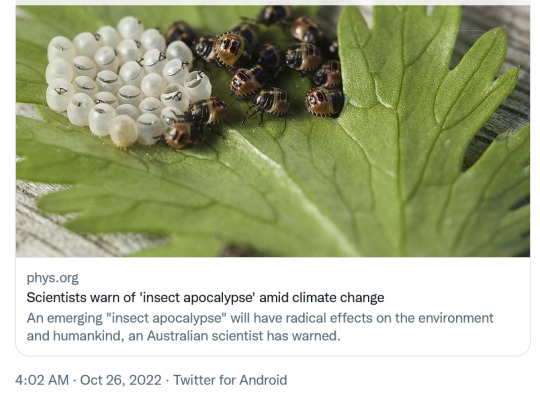
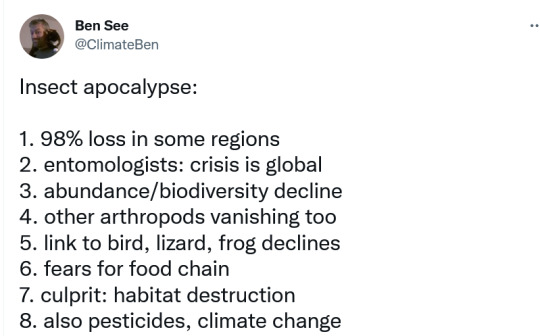
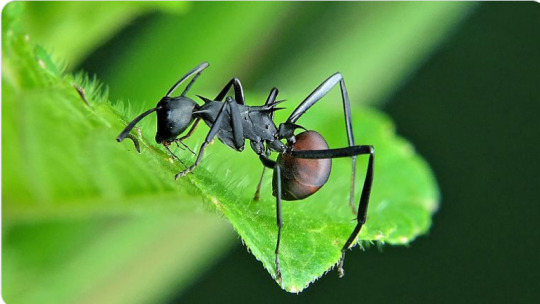
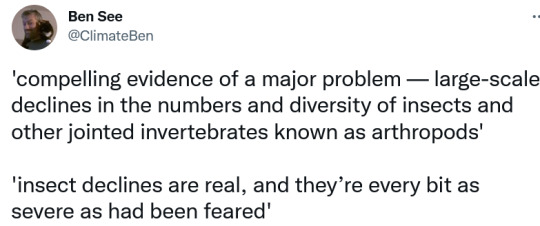
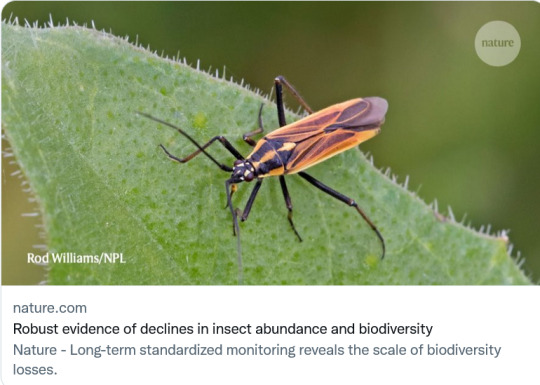
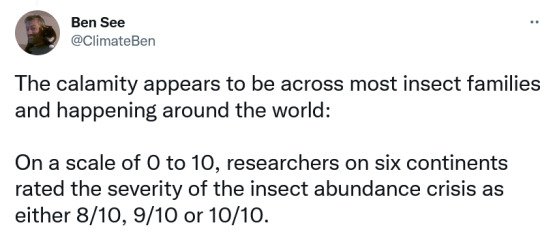
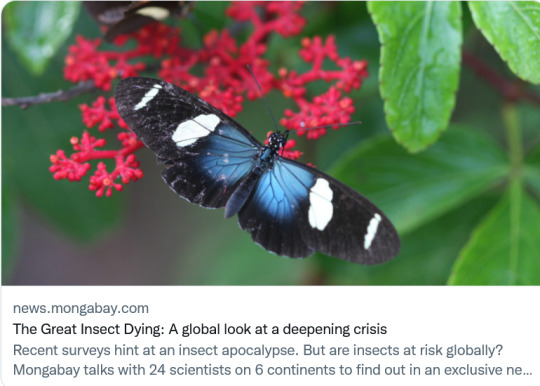
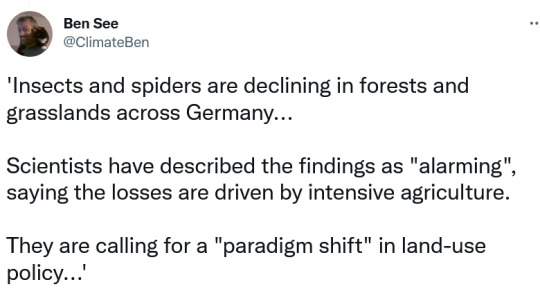
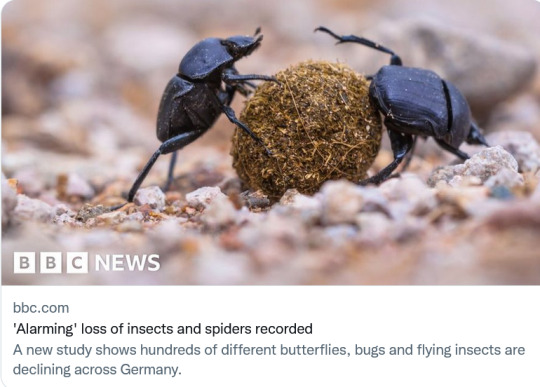

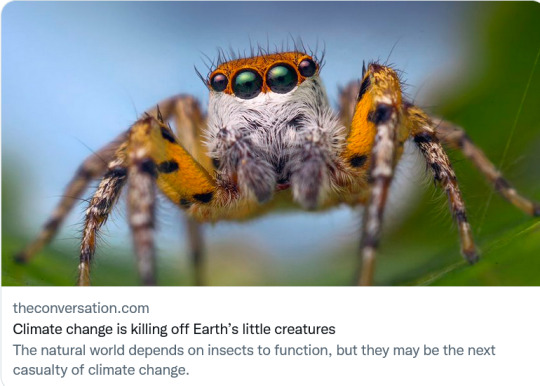
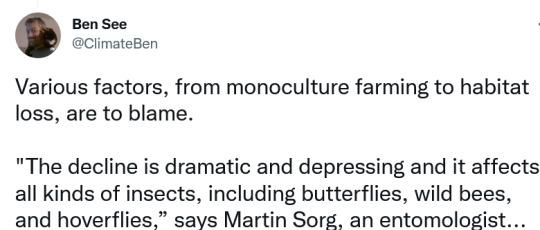
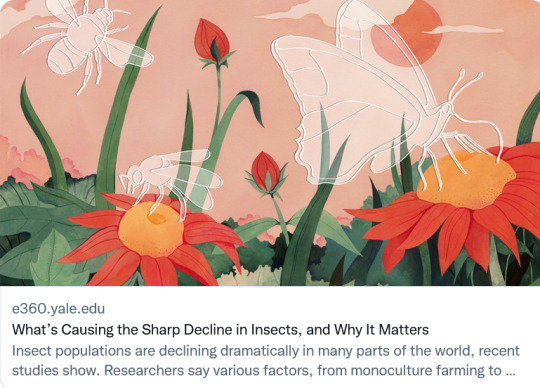
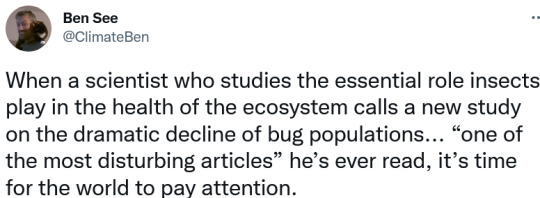
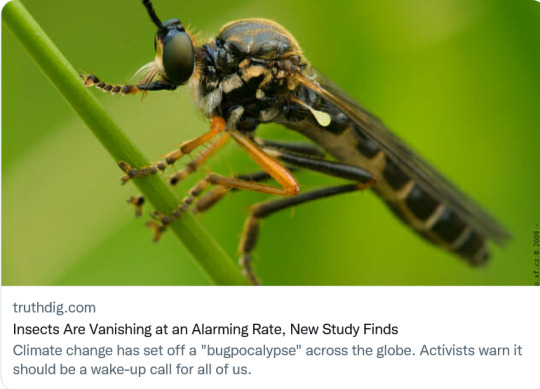
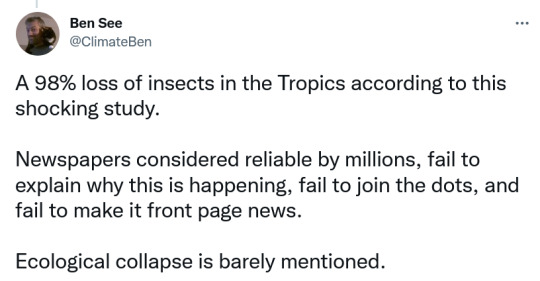

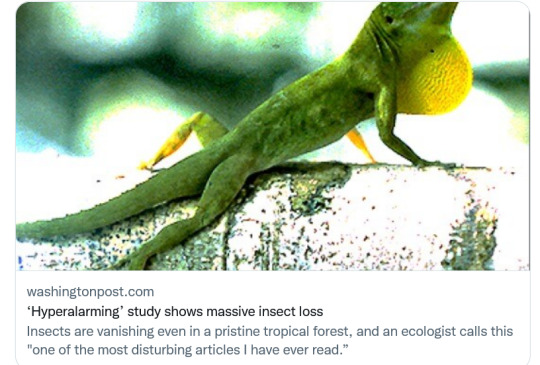
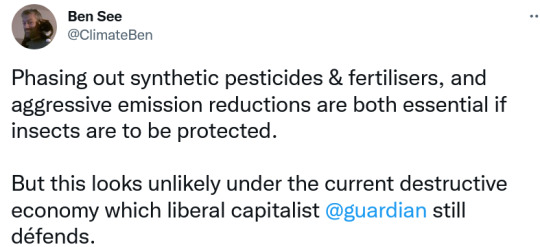
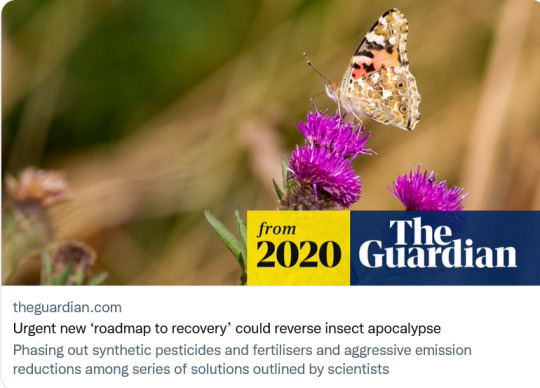
More here.
2 notes
·
View notes
Text
Celebrate the Green Marvels on International Plant Appreciation Day!
April 13 marks a day dedicated to the silent superheroes of our planet – plants. These green wonders not only provide us with the air we breathe and the food we eat but also contribute to the vibrant landscapes we love. International Plant Appreciation Day is a reminder to honor the unsung heroes of our ecosystem.
One extraordinary figure who understood the significance of plants was Richard St.…
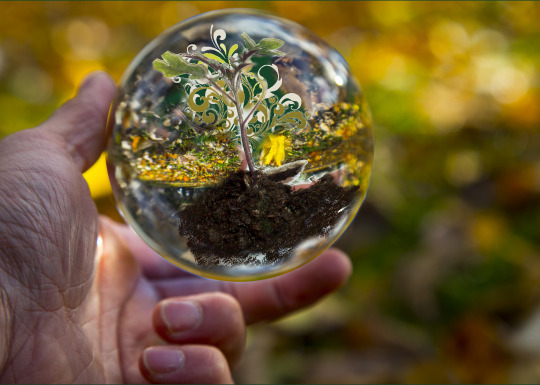
View On WordPress
#2024#animals#April 13#April 26 – April 29#April 30 – May 5#biodiversity#biodiversity crisis#BirdLife#birds#celebration#changes#City Nature Challenge#conservationist#decline#document#Earth#Ecosystem#forests#Friends of the Saskatoon Afforestation Areas#fungi#George Genereux Urban REgional Park#global#green marvels#health#humanitarian#insects#interconnected#INTERNATIONAL PLANT APPRECIATION DAY#invasive#landscapes
0 notes
Text
Pollution is causing less pollination of food crops because insects can't pick up the plants scent!

Just when you think we've got a handle on things we are reminded by nature were still behind the eight ball, and in trouble awkwardly!!
This latest research on global warming and climate change is telling us Air pollution is making it hard for flowers and other growing things to get pollinated, according to a new study in the journal Science.
Now I don't need to tell educated people about what happens when flowers and crops can't be pollinated the natural way, with the help of insects, and when that doesn't happen we have to do it manually, and that effort raises the price of EVERYTHING by ten fold!!!
Ya see the thing is Pollution floating in the air may be invisible to see, but it's bastardizing the scent of everything that grows making it difficult for pollinators (the insects) to recognize the scent of the plant growing.
Insects use their sense of smell to find plants that give off pollen scents up to 5 miles away to attract the insects, but Pollutants called nitrate radicals eat away at the complex chemical signals that plants offer to bees and other insects, and these nitrates are found in urban air across the planet today.
And ya see,.... Without that ability to give off scents to attract insects, then the plant doesn't get pollinated, and the insects can't find sugar to keep on going, so the insect eventually dies out and the plants are manually pollinated raising the cost of food tenfold.
And were still voting to continue this process because people like Trump tell us it's total bullshit, but when you can no longer afford to buy food because the cost is to much, people like Trump will still be eating like kings, and YOU, well no one is gonna care about YOU at that point in the disaster.
Ya see,... Insects are primary consumers in many food chains, and their disappearance would affect animals that depend on them for food, including birds, reptiles, amphibians, and small mammals. The loss of insectivorous species could cause imbalances and disruptions in entire ecosystems!!!!
You stupid dumbasses that you are.
Keep voting the two party corruption and you'll be the ones who get fucked, not your political leaders who are telling you to keep feeding their bank accounts..... Just a random thought about the stupidity of humanity to follow the crowd right over the cliff of disaster, all the while thinking they are making things better.....
1 note
·
View note
Text
According to David Pimentel, the late professor of insect ecology and agricultural sciences at Cornell University, total grain production per capita has been declining since 1984; arable (cropping) land per capita has been declining since 1948; fish production per capita has been declining since 1980; and loss of food to pests has not decreased below 52 per cent since 1990.
"Soil: The incredible story of what keeps the earth, and us, healthy" - Matthew Evans
#book quote#soil#matthew evans#nonfiction#david pimentel#professor#insects#ecology#agriculture#cornell university#food production#farming#grain#decline#declining#arable land#cropland#crops#fish#fishing#food loss#pests#80s#1980s#40s#1940s#90s#1990s#20th century
0 notes
Text
I think one of the absolute most frustrating things for me personally about the current climate crisis / late stage capitalism hell is that ontop of people just outright denying it and acting like the rising temperatures are normal- there’s been like. A VERY noticeable decline in the amount of insects yearly. As someone who goes out of my way to see bugs, every single year for the past decade there has been a sharp decline in bugs. What used to be fun filled summer months running around, catching grasshoppers and petting caterpillars… there’s nothing. I’ve seen one grasshopper this year. I’ve not seen a single caterpillar! It’s currently the ant nuptial flight season in my area and I’ve seen 0 winged ants. They used to all but infest my home during flight season
I remember as a kid, I used to excitedly find ladybug larvae, and I’d relocate them to plants covered in aphids. But I’ve seen one ladybug in the past 5 years, and 0 larvae. I’ve not even seen any aphids. It’s so tangible, it’s so noticeable to me as someone who considered this my absolute favourite season to do my favourite activity in. And I know if the bugs are dying off, other things that eat those bugs are to.
And the absolute worst part? When I tell people about this, the average reaction is ‘good!’. A lot of people will express joy over there being less bugs in the world. Most will express how they’re glad they’ve been experiencing less mosquitos and I want to just grab by the shoulders and shake them and yell TONS OF BUGS JUST DISAPPEARING SHARPLY OVER THE YEARS IS NOT A GOOD THING !!
Anyways. Fellow entomology nerds, have any of you also noticed a drastic decrease in bugs you’re finding yearly or is my area just in a bug deficit.
10K notes
·
View notes
Text
By Henry Porter
The Guardian
May 28, 2023
On 7 May, I tweeted that swifts had appeared in the skies over the shed where I write on the same day in 2022, and predicted, if they kept to their schedule, they would leave overnight on 7 August. My excitement was short-lived. I’ve seen no more than three or four breeding pairs over the village of Blockley, Gloucestershire, whereas last year I estimated 16 to 20 pairs and an end of season exodus of between 50 and 60 birds.
My figures are hardly scientific, but they suggest a decline of between 75% and 85% on last year, an acceleration in an established trend that shows a loss of 60% of swift numbers since 1995.
Last year, I saw something miraculous when returning from a walk at dusk. The village swifts were gathered in a screaming mob. With each pass over the church and the green, they rose higher and higher. At length, I realised they were aiming for a wave of birds flying at great altitude. Binoculars confirmed hundreds of swifts heading south-west.
The disappearance of swifts from our skies is one of the saddest prospects of this epoch of casual extermination. At a minimum, we should recognise what’s happening, and understand that a creature that can fly 1m kilometres in its lifetime and takes our imaginations with its soaring flight is about to join other rare but once common species – the cuckoo, curlew, lapwing, sparrow, numerous migrating warblers, and even the starling.
It’s not as if there aren’t numerous swift groups around the country trying to support the bird with breeding boxes, and inserting swift bricks into walls. Yet these are useless without abundant supplies of insects, and that is where the crisis mostly lies. In the past 20 years, flying insects have declined in Britain by 60%. Worldwide, with current rates of decline, 33% of all insects are at risk of extinction.
I am haunted by a little pink notebook, containing the tiny drawings of my ancestor Anne Porter from 1800 onwards. Between the pages of her view of a watermill, from the 1820s, is a butterfly, perfectly preserved. It is a Scotch argus. This is the only one I have seen, for they are rare and almost gone in England. Between other pages are tiny thunderbugs, or thrips, which hatched in July in their billions but no longer trouble us today.
What haunts me is the unthreatened profusion of bugs in Anne’s lifetime compared with their scarcity today. Go out into the countryside, local park or waste land and you will see far fewer insects than five or 10 years ago. The bugs that smeared your windscreen are almost gone.
So, what do we do? We start by recognising what’s happening on our watch. We put up boxes. We allow our lawns to grow out until July and see wildflowers take hold. We stop using garden pesticides, felling trees and clearing insect habitat. We compel water companies to stop polluting. We form groups and interrogate local farmers about the pesticides they’re using. We show our children, maybe with a cheap magnifying glass, the wonder of a bronze beetle or a red soldier beetle crawling across the lace work of a hemlock flower. Nature is not something separate. It’s not a resource. It is us, our world. Concentrate!
3 notes
·
View notes
Text
I went on a walk today, and saw a bunch of my first bugs of the season!
First up was a bumblebee near the park. I heard it before I saw it - I forgot how nice the sound of its buzzing is! I saw a fly a bit later on siting on a dead leaf, only spotting it because of the contrast of its shiny exoskeleton. As I was leaving I caught a glimpse of a small, white butterfly. I don’t know the species, but they’re pretty common here.
Then, on my way home, I saw a bunch of wasps by a wooded fence! The first was a smaller, black and yellow one that we call yellow jackets. I think I saw another one as well, but it moved too quickly for me to get a good look at it. The final wasp was twice the size of the yellow jackets, with dangling yellow legs and a red-brown body. I’m not sure what species this one is, but I saw a similar one hanging out in our garden last year. I wonder if they were gathering the wood from the fence for their nests.
During the entire walk I also saw some lone ants making their way across the sidewalk, and a few smaller, fly-like bugs that I couldn’t get a good enough look at to see what they were.
It may be a bit silly to be writing all of this out, but I’m just really happy that the bugs are back! The more I learn about them, the more I look forward to seeing them when I’m outside. I hope that once the garden gets going, I’ll get to see them more often when they visit!
#tl talks#outside stuff#bugs#insects#bumbleebee#fly#butterfly#wasp#yelloe jacket#ants#I've been reading a book about how bugs populations are declining a lot#so maybe that's why I'm so happy with seeing them#they're still there#and they're back#Now that I know about them I can't imagine a world without bugs
1 note
·
View note
Text
In light of COP15 beginning (meeting of the worlds’ governments to address biodiversity loss)
Here is a graphic on insect biodiversity loss
It is essential we do something before we end up with a world that’s even more lonely and empty than it already feels
Imagine a world teeming with life slowly flickering off and that’s what we are seeing today
#cop15 conference#biodiversity#biodiversity decline#cop15 news#insect#bugblr#it’s not doing anything yet on Twitter#thought this place may be more sane
1 note
·
View note